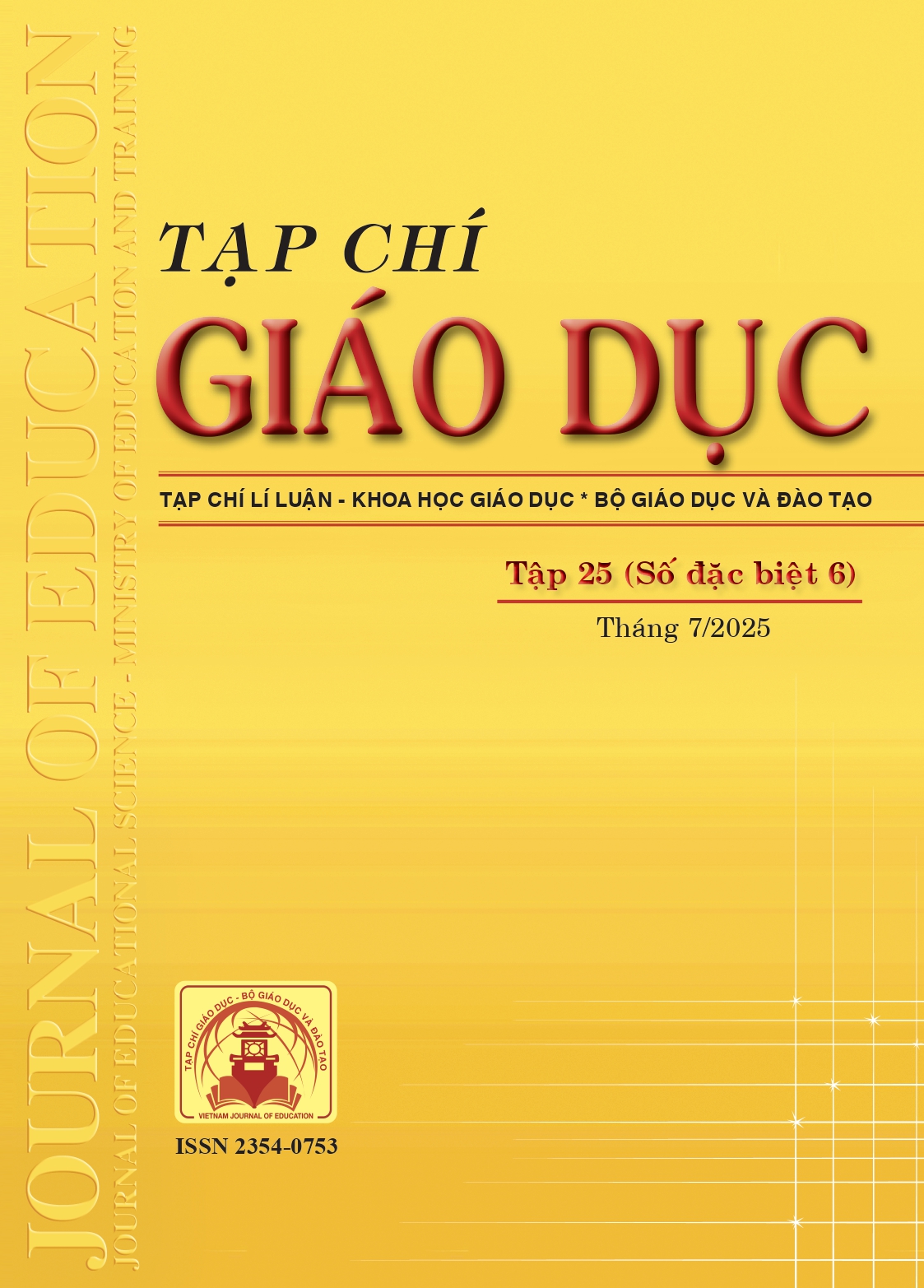Cảm nhận hạnh phúc trong học tập của sinh viên: Nghiên cứu tại Trường Đại học Cần Thơ
- Từ khóa:
- Study
- feel happy
- students
- Can Tho University
Tóm tắt
Academic happiness contributes to enhancing students' learning motivation. The purpose of this study is to explore the current status of academic happiness among students at Can Tho University. This research utilized Ryff’s Psychological Well-being Scale (1989) as the basis for developing items related to academic happiness. A survey was conducted with 578 students using a Google Form questionnaire, revealing that students’ academic happiness was at a moderate level (M=3,33; SD=0,419). There are strong correlations among the indicators of academic happiness in students. Based on these findings, the university should implement support measures to help students enhance their academic happiness. Specifically, Can Tho University should prioritize activities that foster autonomy in learning, environmental mastery, and self-acceptance in learning in order to cultivate a happy learning environment for its students.
Tài liệu tham khảo
Argyle, M. (2001). The psychology of happiness (2nd ed.). Routledge.
Bộ GD-ĐT (2019). Công văn số 2033/BGDĐT-NGCBQLGD ngày 13/5/2019 về việc chỉ đạo, triển khai Kế hoạch nâng cao năng lực ứng xử sư phạm, đạo đức nhà giáo.
Bridget Grenville-Cleave (2023). Ứng dụng tâm lí học tích cực - sống tích cực và hạnh phúc bền lâu - để hạnh phúc dài lâu (Khiết Lam dịch). NXB Hồng Đức.
Dange, J., & Bhavya, B. (2020). Academic happiness: A psychological perspective. International Journal of Research and Analytical Reviews, 7(1), 501-506.
Dubner, S. J. (2013). Happiness: The secret behind better performance. HarperCollins.
Froiland, J. M., Worrell, F. C., & Oh, H. (2018). Intrinsic motivation, learning goals, engagement, and achievement in high school: A test of self-determination theory. Psychology in the Schools, 55(6), 470-482. https://doi.org/10.1002/pits.22120
Jafari, S. M., Azizi, S., & Ghanizadeh, A. (2009). The role of psychological, social and teaching factors in student happiness in educational environments. Procedia - Social and Behavioral Sciences, 1(1), 2037-2041. https://doi.org/10.1016/j.sbspro.2009.01.357
Jongbloed, J. (2018). Higher education and happiness: Perspectives from the capabilities approach. Higher Education Quarterly, 72(1), 50-62. https://doi.org/10.1111/hequ.12142
McCabe, P. C., Bray, M. A., Kehle, T. J., Theodore, L. A., & Gelbar, N. (2011). Promoting happiness and well-being in children. Canadian Journal of School Psychology, 26(3), 177-192. https://doi.org/10.1177/0829573511418482
O'Toole, V. M., & Kropf, J. (2010). The role of schools in promoting students’ emotional well-being. Australian Journal of Education, 54(3), 293-314.
Obasuyi, E., Ezie, O., & Mbachu, O. (2022). Subjective well-being and learning: Implications for student success. Journal of Educational Psychology Research, 14(2), 67-81.
Oishi, S., Diener, E., & Lucas, R. E. (2010). The optimum level of well-being: Can people be too happy? Perspectives on Psychological Science, 2(4), 346-360. https://doi.org/10.1111/j.1745-6916.2007.00048.x
Ryff, C. D. (1989). Happiness is everything, or is it? Explorations on the meaning of psychological well-being. Journal of Personality and Social Psychology, 57(6), 1069-1081. https://doi.org/10.1037/0022-3514.57.6.1069
Ryff, C. D., & Keyes, C. L. M. (1995). The structure of psychological well-being revisited. Journal of Personality and Social Psychology, 69(4), 719-727. https://doi.org/10.1037/0022-3514.69.4.719
Seligman, M. (2010). Flourish: Positive psychology and positive interventions. The Tanner Lectures on Human Values, 31(4), 1-56.
Tabbodi, M., Rahgozar, H., & Makki Abadi, H. (2015). The impact of happiness on academic achievement. International Journal of Educational and Psychological Researches, 1(2), 100-104.
Talebzadeh, H., & Samkan, M. (2011). The role of school environment in improving emotional well-being and school engagement: A case study in Iran. Journal of Educational Management, 25(3), 233-245.
Trường Đại học Cần Thơ (2019). Đề án điều chỉnh, bổ sung quy hoạch phát triển tổng thể Trường Đại học Cần Thơ trọng điểm đến năm 2022, tầm nhìn đến 2030.
UNESCO. (2016). Happy schools: A framework for learner well-being in the Asia-Pacific. United Nations Educational, Scientific and Cultural Organization. https://unesdoc.unesco.org/ark:/48223/pf0000245651
Đã Xuất bản
Cách trích dẫn
Số
Chuyên mục
Giấy phép

Tác phẩm này được cấp phép theo Ghi nhận tác giả của Creative Commons Giấy phép quốc tế 4.0 .












